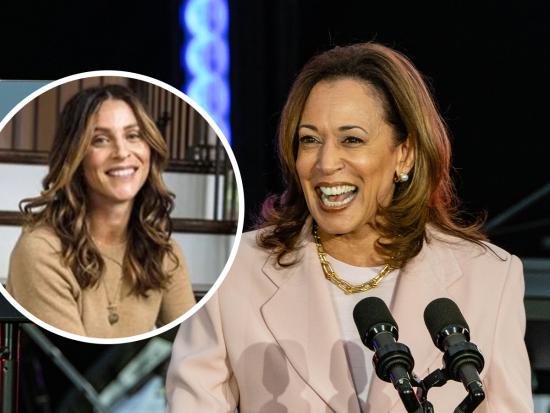
In a political landscape where faith and ideology often collide, Jerushah Duford, the granddaughter of the late Rev. Billy Graham, made headlines by endorsing Vice President Kamala Harris during an “Evangelicals for Harris” Zoom call. Her endorsement, accompanied by sharp critiques of former President Donald Trump and his evangelical supporters, has sparked controversy and debate within the Christian community.
Jerushah Duford, daughter of Billy Graham’s oldest daughter, Virginia “Gigi” Graham Tchividjian, is no stranger to the public eye. Her family name is synonymous with American evangelicalism, and her grandfather’s legacy as one of the most influential Christian leaders of the 20th century casts a long shadow. Yet, Duford’s recent endorsement of Vice President Harris marks a significant departure from the political affiliations traditionally associated with the Graham family.
Speaking in a pre-recorded video due to her inability to attend the virtual event live, Duford expressed her support for Harris, not as a mere political decision but as a moral imperative. “I was thinking this morning that if you told me 10 years ago that I would be taking an active role in politics, I’d have laughed. But then I had to stop and realize this is so much more than politics,” she said, emphasizing the deep conviction behind her involvement.
Duford’s endorsement was not just a vote for Harris but a pointed critique of the evangelical community’s support for Trump. She recounted the moment in 2016 when Trump’s behavior, particularly his boastful comments about assaulting women, shattered her perception of evangelical leadership. “In 2016, when a man bragged about assaulting women, various leaders of my faith then propped up this man as a poster boy for godly manhood and leadership,” Duford lamented.
She further elaborated on the spiritual consequences she believes have resulted from evangelical support for Trump, referencing Isaiah 1:30, which likens the unfaithful Israelites to “an oak whose leaf withers” and “a garden without water.” Duford implied that Trump supporters within the evangelical community are leading people away from Christianity, drawing a parallel between the moral decay she perceives and the withering oak described in Isaiah.
Duford’s comments were particularly striking given her family’s deep-rooted ties to conservative evangelicalism. Her uncle, Franklin Graham, has been one of Trump’s most vocal supporters, often praising the former president’s policies and aligning them with Christian values. In stark contrast, Duford’s endorsement of Harris and her condemnation of Trump represents a significant ideological rift within the Graham family and the broader evangelical community.
Duford’s critique goes beyond politics and delves into the theological implications of evangelical support for Trump. She warned that the gradual erosion of moral standards among some evangelical leaders, who she claims have excused Trump’s behavior, could have dire consequences for the Christian witness in America. “The oak leaves don’t wither overnight. And I’m terrified to think of how far this is turning our head the other way and making excuses will take our country — but more importantly, our witness to the world,” Duford said.
She also highlighted the importance of Micah 6:8, a verse that emphasizes justice, mercy, and humility, which she said was her grandfather’s favorite. Duford made it clear that while she does not expect the president to be a Christian, she does expect faith leaders to support actions that reflect these biblical principles.
Duford’s endorsement was also a call to action for fellow Christians. She urged them to take the “Evangelicals for Harris pledge” and engage in acts of service in their communities. Her message was clear: voting for Harris is not just a political decision but a moral stance against what she sees as Trump’s leadership’s corrosive influence on the Christian faith.
The response to Duford’s endorsement has been mixed. While some have praised her for taking a stand against what she views as hypocrisy within the evangelical community, others have criticized her for using her family’s name to advance a political agenda that is at odds with traditional evangelical values.
Franklin Graham, in particular, has been vocal in his opposition to the “Evangelicals for Harris” campaign. He accused the campaign of misleading people by using a clip of his father, Billy Graham, in one of their ads. The ad juxtaposed a sermon by Billy Graham with a 2015 interview in which Trump said he had never asked for God’s forgiveness, a statement that Franklin Graham claims misrepresents his father’s views.
The division within the Graham family reflects a broader divide within American evangelicalism. While some evangelicals have remained steadfast in their support for Trump, others, like Duford, have grown increasingly disillusioned with what they see as the moral compromises made by their faith leaders.


